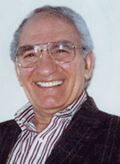Fakhri A. Bazzaz
From an “Ecologist Directory” maintained by the ESA Education Office about 2004-2011. Profile circa 2004.
Degree Ph.D. 1963 (University of Illinois)
Position Mallinckrodt Professor of Biology
Department Dept. of Organismic and Evolutionary Biology
Organization Harvard University

Describe your route to a career in (or using) ecology. What challenges did you need to overcome? What was your training, and what positions have you held?
I was interested in Ecology when I got a fellowship to study in the United States. I met my advisor, Dr. Larry Bliss, and was struck by his generosity and dedication. I was assigned to study succession, as Professor Bliss was a tundra ecologist. I dabbled in a variety of techniques from physiology to populations. As a result, my thesis was a long list of articles including soils. I discovered that the soil of southern Illinois had a fragipan which restricted root growth.
When I graduated with a Ph.D., there were plenty of jobs. I was appointed as a Visiting Assistant Professor at Illinois University. I then went to my home country for two academic years. While I was discussing with the University of California, I was asked to return to Illinois, which I did. My wife and I returned to Illinois where she did her Ph.D. and I was appointed as Assistant Professor. I got promoted to Associate Professor and then Professor. Then I became Head of the Department and Acting Director of the School of Life Sciences, which included six departments. At Harvard University, I started as the H.H. Timken Professor of Science and am currently the Mallinckrodt Professor of Biology.
What key advice would you offer a student today?
Ecology is a very interesting science. One has to keep complexity in mind. There are many interacting disciplines from soil to geology to physiology to populations.
We ought to recognize that ecology is a very complicated subject. It involves many things. We need new statistics where factor interaction is important. We also need to repeat experiments more often, for I am convinced that repeating experiments may glean different results. Real programs in Ecology will be accomplished by doing this.We also need to pay particular attention to societal problems. The earth is polluted, and invasive species are now everywhere. We need to pay particular attention to the problems of the environment. With the accelerated movement of people, invasive species will be more widespread. This may modify the ecosystem service.